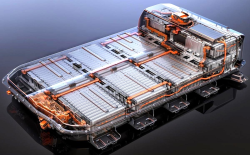
—
A Chevrolet Bolt battery settlement that was preliminarily approved by the judge in September 2024 has not received final approval nine months later.
Eight Chevy Bolt class action lawsuits were filed in late 2020 and early 2021 after the National Highway Traffic Safety Administration opened a federal investigation into Bolt battery fires.
General Motors issued battery recalls (here, here and here) to install software, replace defective batteries and in some cases buy back the Chevy Bolts. The recalls included 57,000 model year 2017-2019 Chevrolet Bolts and 52,000 model year 2020-2022 Chevrolet Bolts.
NHTSA closed its Bolt investigation based on the recalls, software updates, battery replacements and extended warranties.
The eight class actions were consolidated into one lawsuit titled, In re Chevrolet Bolt EV Battery Litigation.
You can read about the settlement agreement here. According to the settlement agreement, the 31 Chevy Bolt owners who sued will receive $2,000 each, and the lawyers representing car owners will receive about $52,000,000.
Chevy Bolt Battery Settlement Still Not Final
It’s imperative to understand that a customer doesn’t join a class action lawsuit because if their vehicle is included in the lawsuit, that customer is considered a “class member” and already included if a settlement is reached.
It’s possible that to receive certain settlement “benefits” a customer may need to file valid claim forms with supporting documentation. But the customer is still considered a class member even if they don’t want to be and even though they didn’t “opt in” or “join.”
This means unless they “opt out” of the settlement, they are considered a member of the class and will not be able to sue an automaker over the same problems or defects.
From the Chevy Bolt battery settlement:
“Your rights are affected whether you act or not. Read the Notice carefully. What if I do not do anything? If you do nothing, you will remain a Class Member. You will still be entitled to receive the Software Final Remedy or the Battery Replacement Final Remedy, but any monetary benefits for which you may qualify can be obtained only by timely submitting a Claim Form or having participated in the E-Card Program. In return for these benefits, you will be bound by the terms of the Settlement, which means you cannot bring a lawsuit against Defendants for the same claims at issue in this lawsuit.”
In 2019, the Federal Trade Commission studied about 150 class action lawsuit settlements and concluded about 4% of customers typically filed claims. However, lawyers are paid based on the number of class members, not based on the claim rate.
Regarding this GM class action, problems were discovered concerning the opt-out process and how some customers apparently tried to opt out of the settlement online. However, the settlement agreement said the only way a customer could opt out was in writing by mail.
In May 2024, the plaintiffs moved for preliminary approval of the Chevrolet Bolt battery class settlement, and in September 2024, Judge Terrence G. Berg entered an order granting preliminary approval of the settlement.
The court order set a February 24, 2025, deadline for settlement class members to opt out of settlement. The judge says GM customers were provided specific detailed instructions as to what a customer must do “for a request for exclusion (or opt out) to be effective.”
“Any member of the Settlement Class failing to properly and timely mail such a written Request for Exclusion shall be automatically included in the Settlement Class.” — Chevy Bolt settlement notice
Lawyers for one group of GM customers filed a motion requesting permission to allow electronic opt outs, but the judge ruled the motion “improperly sought to alter the opt-out procedure set forth in the Parties’ Settlement Agreement and enforcing ‘the requirement of a physical signature.’”
Then in February 2025, the plaintiffs filed a motion for final approval of the Chevy Bolt battery settlement.
However, things changed in May when the settlement administrator said there had been 2,930 opt-out requests to be excluded from the GM battery settlement, and 1,103 of those opt-out requests were deemed invalid. The administrator says the opt-out requests didn’t comply with the rules, including the issue of no electronic opt outs.
At about the same time, the judge learned of “an estimated 3,800 Vehicle Identification Numbers (VINs) inadvertently omitted from the class list provided to the Settlement Administrator in October 2024.”
The judge has now set an August 22, 2025, deadline for these “supplemental-notice Settlement Class Members” to object to the battery settlement, and the deadline for them to opt out or file a claim is September 22, 2025.
“The Parties have met and conferred about a procedure by which any person who believes that he or she validly opted out, but who does not appear on the Amended Exclusion Report, may challenge the Settlement Administrator’s decision to deem their opt out invalid.” — Judge Berg
CarComplaints.com will update our website when the Chevrolet Bolt battery settlement is granted final approval.
The Chevy Bolt battery settlement debate is being held at the U.S. District Court for the Eastern District of Michigan (Southern Division): Altobelli et al., v. General Motors LLC, or, In Re Chevrolet Bolt EV Battery Litigation, Case No. 2:20-cv-13256.
The plaintiffs are represented by The Miller Law Firm, PC, and Keller Rohrback, LLP.

